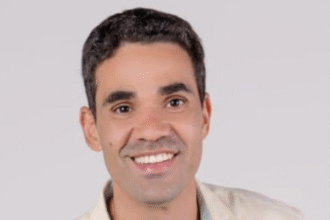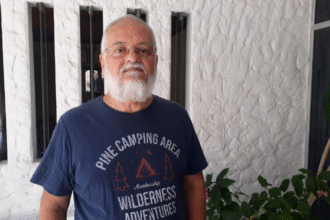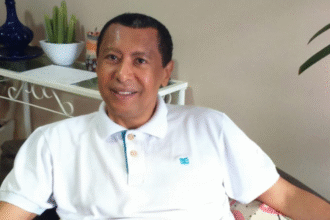The writer and poet Irene Genecco presents us with a fascinating work, “A Look Beyond Daily Life: Urban Tales & Others What Such”, in which she uses seemingly common situations to explore deep and current themes. With 20 stories that mix short stories and chronicles, the author invites us to reflect on the effects of time, the fear of aging, family relationships and the difficulty of keeping up with the rapid changes in the modern world.
Through real narratives and pure fiction, Irene Genecco transports us to varied universes, exploring dreamlike, spiritual and metaphysical elements. Amid protagonists in search of their true essence, we are led to question the exhausting competitive and accelerated reality that often surrounds us. Each story is enriched with musical cues that complement the emotions of reading, creating a unique and engaging literary experience. “Um Olhar Para Além do Cotidiano” is an invitation to detach oneself from the superficial and delve into deep reflections on life, time and the search for inner freedom.
How did the inspiration to write “A Look Beyond Daily Life: Urban Tales & Others What Such” come about? What were the main motivations behind this book?
My book is composed of different moments of my life. They are writings made over 30 or 40 years, but I also add recent writings. What characterizes my speech is not contained only in “Um Olhar para Além do Cotidiano”, but is present in everything I write.
Short stories, chronicles and poetry are my modes of expression. The garment (surface) of this writing is made up of common situations, but for me never banal – this is where the expression “a look beyond” comes into play. I would call these everyday, everyday, apparently superficial situations “tiles”, as in “if this street were mine, I would have it tiled”. However, like a tiled work, the different angles end up integrating, interpenetrating, and the harmony of the word appears in the background, provoking reflections in everyone who is willing to read. The thread that unites this diversity of perceptions when writing is always a magnetic thread: the search for oneself, restlessness, conflicts, fantasies, reality and unreality, together and mixed.
“Urban tales” would fit into the so-called “reality”, and “Others that such” would be part of the imagination, and/or fiction, never “unreal” in its entirety. The result of this is the emergence of transcendence of the merely concrete of life, of the materiality that subjugates us. In the meantime, it is possible to envision something greater, which does not get corrupted, which does not end.
The work addresses themes such as time, the fear of aging and family relationships. How do you use short stories and chronicles to reflectively explore these issues?
I don’t use the stories, they use me. I am the instrument that detects and writing is a consequence and expression of this. Let’s see: About time, I believe that perhaps it would be better to understand it as something concrete, and not abstract as it may seem. I talk about this in the short story “A estação do tempo”: if time were abstract, abstract would be our joy and our suffering. However, we taste in our skin, in our mind, in our mood, in health or illness, the effects of this temporal vision.
Time seems to rule, dominate and even defeat us in many circumstances, as something that governs and consumes us, invisible and dictatorial. It’s like fighting a ghost, we never know where it comes from, where it is and where it’s going. But when we realize that time is just the organization of what we choose to be and practice, with the consequences of this, everything becomes clearer, and relatively easier.
Everything depends on us, even if we are involved in a system of government, culture, society or religion. We will always have choices to make. This is the relativity of time, the order we place on what is most important or least important in life. Life, whose time is just a synonym, is movement, action and mutation, therefore nothing abstract, as it depends on strength, discernment and decision in the face of challenges.
I believe that no one is afraid of getting old, because this is part of life. Fear does not concern age, or any other physical aspect. It concerns the threat of exclusion from being that is imposed by dominant systems. It is the threat of feeling banished from this or that possibility, it is a closing of horizons. This frightens, paralyzes and consumes the taste, joy and pleasure of living.
Prejudice does not have a life of its own, it is made up of joint predeterminations in an environment. It is biunivocal, it only appears in a ‘purchase and sale’ type relationship. That is, someone decrees how things should be, and someone buys this as absolute truth. Both moved by a common element: the fear of being banished from a vital belonging, being excluded from the group. This sustains a dominated/dominator relationship. This reflection already includes the third point, about family relationships.
How do I use these reflections when writing? I don’t think of values and principles like start to give fluidity to writing. I would be using myself: it would be an adapted, artificial, limited text, even if it fulfills formal linguistic and logical requirements. Maybe that’s why AI will never cover the subtlety of living intelligence – sensation and feeling intertwined with intellect, composing something unique and induplicable. It is this extremely profound and infinite subtlety that characterizes our look and our understanding of things.
The values, reflections, considerations and pillars that structure the writing come by themselves, in the fusion between the concrete and the abstract, the event itself and what we feel and think about it. We could call this inspiration.

In “Add me on MSN (again!)”, one of the stories in the book, you address online relationships and an older woman’s lack of knowledge in this context. What is the importance of discussing technology and its influences on human relationships?
The issue is not the “technological” virtual world, but the virtual relationships that seem to take shape in the contemporary world. It is important to discuss and learn new technologies and include them in your daily life, however, it is more important to understand that affective bonds, emotions, relationships and the search for wholeness and growth remain untouched.
The woman’s conflict in the short story is not with technology. What holds her back are her own exported and imported prejudices, regarding age, being single for ten years, divorced, and venturing into another relationship. “Will my children judge me inconsequential?”, “Is this guy making fun of me?”, “Is it still time for me to update myself with this calculating, disguised and malicious world that is hidden in the virtual world?” . Her difficulties with technology are real, but possible to reverse, albeit with reservations. What is irreversible is the loneliness facing this false world, and the feeling of being used by a system that favors deception and deceit.
“Relativizando” deals with age-related prejudices, especially of women. How do you see the relationship between aging and capitalism in contemporary society?
Self-consciousness in the sense of an ephemeral beauty, propagated and disguised as happiness, affects and consumes human dignity, at any age, both in men and women, but more cruelly in women.
Consumerism and superficiality distance us from a deeper knowledge of ourselves and trivialize us.Our demands, physical and mental, are low quality: competition, fame and success are our targets, regardless of who or what we are using as a ladder. We become machines, we are supplied, programmed and activated from the outside by an artificial intelligence, moved by the system, never by the impetus of a real need or clamor of our human nature.
We are thirsty for substance, but we are lost in the existential emptiness of the relative and fleeting. Limited to the deification of the physical body, the salary level, the area where we live, or even what kind of professional activity we fit in, we are faced with an anguishing inner discomfort. The lack of meaning that we shape in our adult life holds us back.
“Nowadays, we see women who are terrified when they reach 30 years old, without having their lives directed yet. It is there that the first signs of decay of physical vigour are also manifested. Aging becomes synonymous with decrepitude, and all its synonyms resemble bankruptcy. Wisdom and maturity do not arouse greed in anyone. Where would wisdom feed the freshness of immediacy or competition? Without competition, how to feed consumerism? Without consumerism and without competition, the beauty myth, centered on the primacy of appearances, dies. I stop here…” – Transcription of part of the chronicle “Relativizando”
In addition to realistic tales, you use fantastic, dreamlike and metaphysical elements in some narratives. How do these elements contribute to exploring the conflicts of human existence?
I think that fantasy, dream and metaphysics are connected in the role of relieving tensions, giving vent to our fears and elevating us above the dictatorial limits of rules and formalisms. It is a liberating dimension of everyday life, banality and inductive currents to right and wrong. But metaphysics is not characterized exclusively by fantasy. It is a perception more linked to the intellect, to the logical ability to frame cause and effect in terms of life, beings, and the universe as a whole. Metaphysics is something, as the name says, that goes beyond what our physical senses affirm.
The fantastic and the oneiric differ from Metaphysics, because the former are born from the imagination, they are invented, where everything fits. The latter is like an unfolding of intellect, reason, the logic of cause and effect. This one, although abstract and invisible, seems more real.
In “Concepción”, you present the fertilization of a woman through cosmic dust, while “O Pesadelo de Lolita” delves into the nightmares of an adopted teenager. Why did you choose to address these specific themes in your stories?
I do not plan or choose the approach to a theme before writing, especially in short stories. I sometimes do this in a chronicle, but a story, chronicle or poetry is always born from an intuition first, from a sudden feeling, from a thought not resulting from reflection, from an unprecedented, inexplicable perception, a sensory, visual or auditory impact.
Sometimes I keep this for two or three days, and then I sit down to write. If this time passes, the inspiration expires. “Conception” I wrote in one breath, within about 15 or 20 minutes, moved by the magic of the words, by the sound and beauty of the sequence that began to unfold in my head. I wrote it by hand, then switched to the computer. After I finished, I went to research whether Neptune actually has gaseous rings, and whether they were made of methane gas. And I confirmed. I am not describing the fertilization of a woman, but the emergence of woman and man, in an encounter between egg and spermatozoon, who wandered without bodies in the cosmic dust. As for Lolita’s nightmare, I describe my own fears and fantasies when she was a teenager. I was adopted.
The protagonists of the stories seek to find themselves in a context of rapid changes, out of step with society. How do you see the importance of seeking connection with one’s essence and freedom in a world that values haste and superficiality?
Our inner essence comes from without. Outside and inside are sides of the same coin: they are our absorptions that pass through the filter of our judgment and ability to discern, when there is maturity and conditions for it. That’s why we call it “internal”. The essence of the world is life, therefore it is action, movement, speed, combat, personal and collective struggles.
The apparent mismatch of intellectuality, emotions, conflicts, misfits, meetings and disagreements is part of the freedom of choice of each being. I say apparent, because the social complex is much more complex than we can assume, individually. Each one has their moment to understand certain things. There is no absolute or genuine individuality, per se, as each one of us is created, educated and intellectually fed by a society moved by paradigms and beliefs.
Our essence is a cocoon, where we develop wings, while the external side, or the surface, confines us in passions that dominate us, in a collective hypnosis. Haste is part of a system aimed at alienation, in the interest of exercising dominion, in which there is no time to think because thinking frees you. Only an alienated conscience allows itself to be ruled and submitted.
It is a game of dominated and dominant, which only ends when we begin to develop our sense of transcendence between appearance and true content, or between transitory form and the substance that sustains everything and leads to growth and overcoming challenges.
In addition to being a writer, you are also a pedagogue and have experience in the field of education. How does this experience influence your writing and the themes you address in your books?
My academic background is Education, and despite never having practiced the profession (except in internships and small experiences of voluntary work), I draw from this fertile land all my learning. Education is the foundation of all learning, because it puts us face to face with the fragility of human beings in their ignorance and natural innocence, since we arrived in this world. Educating is an act of love and love is the oxygen of life.
Education, whether systematic or not, has principles of equality, equity, discipline, respect and brings out the best in us. Together with philosophy, it sprouts wings in us towards a world of more balanced and healthy relationships.
“A Look Beyond Daily Life” is his third published book. How do you perceive the evolution of your writing throughout these works? What lessons did you take with you to build this new job?
I believe that already in the first work, a collection of poems in Anthology, in 1985 – “When the Leaves Fall” I already had the feeling of sowing myself through writing. However, the desire for applause and public recognition was much stronger. In my book from last year, “No Mundo da Ficção, Só que Não”, I transcribe reports of experiences I lived, (such as regression to past lives and Ayahuasca) that lead to metaphysical reflections.
If I join times and themes, I see that metaphysics continues to be my compass. In terms of “evolution” I feel more whole, and not more in pieces as younger. I understand that by correcting my look, beyond what the physical sense can reach, I improve myself with more integrity and I have more to offer of myself. This led me to bring together my past writing with more current writing and condense it into this current book.
In addition to being a writer, you maintain the blog “Além da Margem do Mundo”, in which you write about various topics. How does interacting with readers and exchanging ideas on the online platform influence your writing and creative process?
Having a public platform gives life to my desire and pleasure to write, because writing is an act of exchange and sharing, never an act condemned to isolation and anonymity. Even if my name wasn’t there, nothing would be anonymous. I feel present in my words: all of them say “I am!”. Knowing that someone is aware of our thoughts, whether praising or not, gives us signs and a sense of belonging, like “Hey, someone sees me!”.
I still don’t have interaction with readers, because it’s been a while since I created this space. But that doesn’t matter much for now. When I hear the plim-plim on the cell phone, letting me know that someone is visiting my blog, this is enough for me, to fulfill myself. The important thing is my planting myself there. I know someone reads, and will read.
Maybe there are people who keep their writings to be seen after death, I don’t know. In my case, it does me a lot of good to know that I am throwing my ideas and ideals out into the world, like sowing the ground for future generations. Maybe it’s a way to make myself concrete in eternity, in this orb.
Follow Irene Genecco onInstagram





